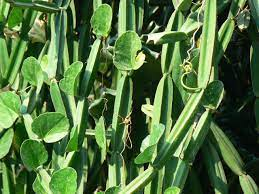NANNARI (Hemidesmus indicus)
Introduction
Nannari, also known as Sarsaparilla, is a medicinal plant
widely used in Ayurvedic and traditional medicine systems. Its botanical name
is Hemidesmus indicus, and it belongs to the Apocynaceae family. Nannari
has a long history of traditional use in India, particularly in Tamil Nadu,
where it is highly regarded for its therapeutic properties. This article delves
into the medicinal uses and benefits of Nannari, shedding light on its various
applications in promoting health and well-being.
Botanical Description
Nannari is a perennial herbaceous plant that grows up to one
meter in height. It has slender, woody stems and dark green leaves that are
elongated and lanceolate in shape. The plant produces small, fragrant, and
pale-colored flowers, followed by round, reddish-black berries. The roots of
Nannari are the most valued part, as they contain the key bioactive compounds
responsible for its medicinal properties.
Medicinal Uses of Nannari
- Blood Purifier:
Nannari is widely recognized for its blood-purifying properties. It helps
eliminate toxins from the bloodstream, promoting overall health and
vitality. Regular consumption of Nannari tonic or syrup is believed to
improve complexion and treat various skin disorders caused by impurities
in the blood.
- Cooling Agent:
Nannari possesses cooling properties that make it useful in treating
heat-related conditions. It helps in reducing body heat and is often used
to provide relief from heatstroke, prickly heat, and general heat-related
discomfort.
- Respiratory Health:
Nannari is used to alleviate respiratory issues such as cough, bronchitis,
and asthma. Its expectorant properties help expel mucus and clear
congestion in the respiratory tract, providing relief from respiratory
ailments.
- Diuretic Effects: The
diuretic nature of Nannari makes it useful in promoting urine flow and
aiding kidney function. It helps flush out toxins, reduce water retention,
and prevent urinary tract infections.
- Detoxification:
Nannari is considered a potent detoxifying agent that aids in the
elimination of waste products from the body. It supports liver function
and helps in the removal of toxins, thus enhancing overall detoxification
processes.
- Anti-inflammatory
Properties: Nannari exhibits anti-inflammatory effects, which make it
valuable in managing inflammatory conditions such as arthritis, gout, and
joint pain. It can help reduce swelling, redness, and discomfort
associated with these conditions.
- Digestive Health:
Nannari is known to improve digestion and alleviate gastrointestinal
issues. It helps in the secretion of digestive juices, enhances appetite,
and aids in the absorption of nutrients.
- Boosts Immunity:
Regular consumption of Nannari is believed to strengthen the immune
system, making the body more resistant to infections and diseases. It is
rich in antioxidants, which help combat free radicals and support immune
function.
- Anti-aging Benefits:
Nannari possesses antioxidant properties that help in neutralizing the
damaging effects of free radicals, which contribute to aging. It is
believed to promote youthful and radiant skin by reducing wrinkles, fine
lines, and age spots.
- Stress Relief:
Nannari has calming and stress-relieving effects on the body. It is often
used to manage anxiety, nervousness, and mental fatigue. Nannari tea or
syrup is consumed to promote relaxation and emotional well-being.
Methods of Administration
Nannari can be consumed in various forms to harness its
medicinal benefits:
- Nannari Syrup:
Nannari syrup is a popular preparation made by boiling Nannari roots in
water and adding sweeteners. It is consumed as a refreshing drink, often
mixed with water or soda. Nannari syrup is readily available in the market
or can be prepared at home using Nannari roots and natural sweeteners.
- Nannari Tea: Nannari
roots can be steeped in hot water to prepare a herbal tea. This tea is
known for its cooling and detoxifying properties. It can be enjoyed plain
or with a touch of honey and lemon for added flavor.
- Nannari Extracts:
Concentrated Nannari extracts are available in the form of tinctures or
capsules. These provide a convenient way to incorporate Nannari into one's
daily routine.
- Nannari Powder:
Nannari roots can be dried and powdered, and the powder can be used in
various preparations such as herbal drinks, tonics, and herbal
formulations.
Precautions and Side Effects: While Nannari is generally safe
for consumption, it is advisable to exercise caution and follow these
guidelines:
- Pregnant and
lactating women should consult a healthcare professional before consuming
Nannari products.
- Individuals with
underlying health conditions or those taking medications should seek
medical advice before incorporating Nannari into their regimen to avoid
potential interactions.
- Excessive
consumption of Nannari may cause stomach discomfort or diarrhea in some
individuals. It is important to consume Nannari in moderation and follow
recommended dosages.
- As with any herbal
remedy, it is always recommended to purchase Nannari products from
reputable sources to ensure quality and authenticity.
Conclusion: Nannari, or Sarsaparilla, is a versatile and
highly valued medicinal plant in Tamil Nadu. Its various health benefits,
including blood purification, cooling properties, respiratory health, and
digestive support, have made it a staple in Ayurvedic and traditional medicine.
Incorporating Nannari into one's lifestyle, whether in the form of syrup, tea,
or extracts, can contribute to overall well-being and provide relief from a
range of ailments. However, it is essential to seek professional advice and
consume Nannari in moderation to ensure safe and effective use.
HAPPY
BLOGGING!!!
DEEPIKA
KRISHNAMOORTHY
A
RESEARCH SCHOLAR




Comments
Post a Comment